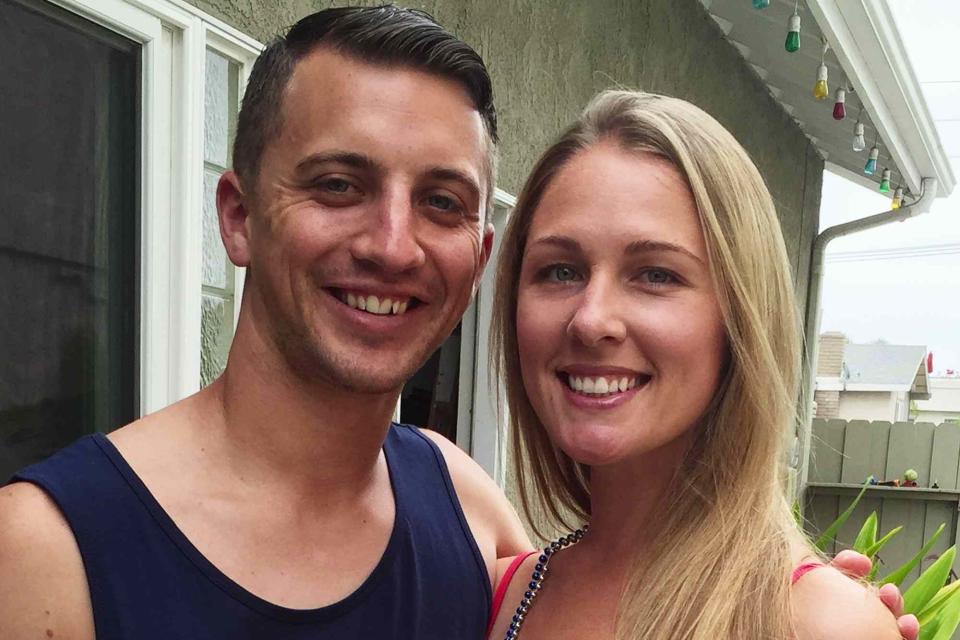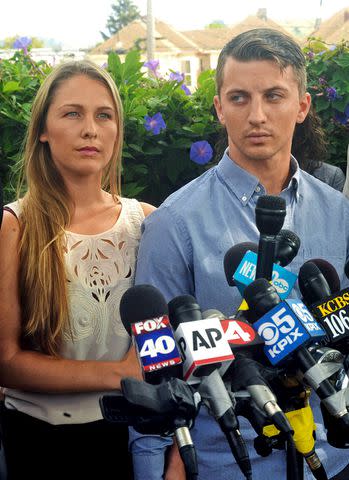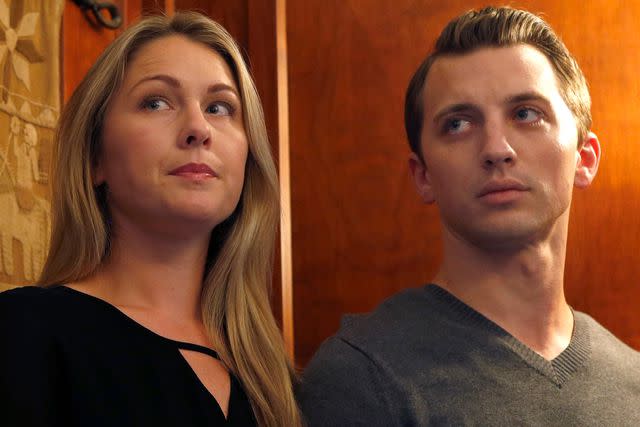'American Nightmare' Kidnapping Victim Was Harassed Online After Hoax Claim: 'A Whole Persona Was Created'
For years, Denise Huskins faced online harassment despite her story being vindicated when the FBI arrested her kidnapper in 2015

Courtesy of Netflix
Aaron Quinn and Denise Huskins• Police initially didn't believe that Denise Huskins had been kidnapped and sexually assaulted
• Her ordeal is the subject of the three-part docuseries American Nightmare, now streaming on Netflix
• After police said her claims were a hoax, Huskins received abusive online messages — messages that continued even after police admitted their error
Denise Huskins’ was released by her kidnapper two days after an intruder broke into her Southern California home, changing her life forever. But her nightmare wasn’t over.
Local police publicly cast doubt on Denise and her boyfriend Aaron Quinn’s harrowing story — that an intruder broke into their home in the middle of the night wearing scuba gear, forced Aaron into a closet, and kidnapped Huskins, dropping her back off outside her mother’s house two days later — and much of the public soon followed suit.
Denise and Aaron’s story is the subject of Netflix’s new three-part true crime series American Nightmare, which began streaming this week.
But two years ago, Denise spoke with PEOPLE and recounted what it was like for the three months in 2015 when the claims of police led to relentless attacks from members of the public who had become invested in the case, which became known as the "Gone Girl" case, referencing the 2012 novel and 2014 movie about a hoax kidnapping.
"When I was kidnapped, I didn't know if I was going to live to see another day," Denise told PEOPLE then. "I just wanted to go back to my life. And then to have people attacking you on social media, the whole 'Gone Girl' label — a whole persona was placed on me that had nothing to do with who I am."
Related: American Nightmare: Where Are Denise Huskins and Aaron Quinn Now After the 'Gone Girl Kidnapping'?

Mike Jory/The Times-Herald via AP
Denise Huskins and Aaron QuinnThe same day Denise reappeared outside her mother’s house in Orange County, some 400 miles from her home, then-Vallejo Police Lt. Kenny Park told the San Francisco Chronicle that there Denise’s kidnapping appeared to be an “orchestrated” event and there was “no evidence” to lead them to believe Denise and Aaron were telling the truth.
No evidence they found, at least. Three months later, the FBI would tie Denise’s kidnapping to a similar crime scene at another home roughly 40 miles away. Federal authorities soon arrested Matthew Muller, a former Marine and disbarred Harvard-educated immigration attorney, who later pleaded guilty to the crime.
Want to keep up with the latest crime coverage? Sign up for PEOPLE's free True Crime newsletter for breaking crime news, ongoing trial coverage and details of intriguing unsolved cases.
Huskins and Quinn would go on to sue the City of Vallejo for defamation, claiming that instead of helping them find the kidnapper, Vallejo police instead “destroyed their reputations through an outrageous, completely unprofessional, and wholly unfounded claim of disparagement.”
The couple would eventually win a $2.5 million settlement in 2018.
Still, even after Muller's arrest, the damage was done. Denise continued to receive attacks online, even years after Muller’s arrest. In 2017, CBS reported that she was still getting messages from people around the country who continued to believe the Vallejo Police Department’s initial mistaken theory.
"Are you that horrible lying woman who faked her own kidnapping???” one man claiming to be from Illinois messaged Denise, threatening her with violence. Denise shared the man’s post on her Facebook page, hoping to “increase awareness” around online harassment.
“Unfortunately this is just one example of countless messages like this that I have received. And like the ones before this, unfortunately this guy won,” she wrote on social media. “After reading this I went into one of my many PTSD episodes of terror."
Related: Terror & Betrayal: They Were Attacked, She Was Abducted — and Police Said It Was All Lies

Paul Chinn/The San Francisco Chronicle via Getty
Denise HuskinsSeveral weeks before the Netflix series premiered, Aaron told PEOPLE the couple is doing their best to focus on their future — not the abuse they continue to endure online or the lingering questions they have about the case, like why Muller targeted them in the first place.
"Like many victims, or many people who have gone through tragedy, you don't get all the answers,” Aaron said. "And that can be a sticking point to recovery. So for us, we don't rely on finding those answers, but what we have to do is move forward in the unknown and focus on things that matter the most to us, like our family, our kids, our work. Those are sustainable things. And having the answers of why they targeted us doesn't change what we do as far as moving forward.”
If you or someone you know has been sexually assaulted, please contact the National Sexual Assault Hotline at 1-800-656-HOPE (4673) or go to rainn.org.
For more People news, make sure to sign up for our newsletter!
Read the original article on People.


